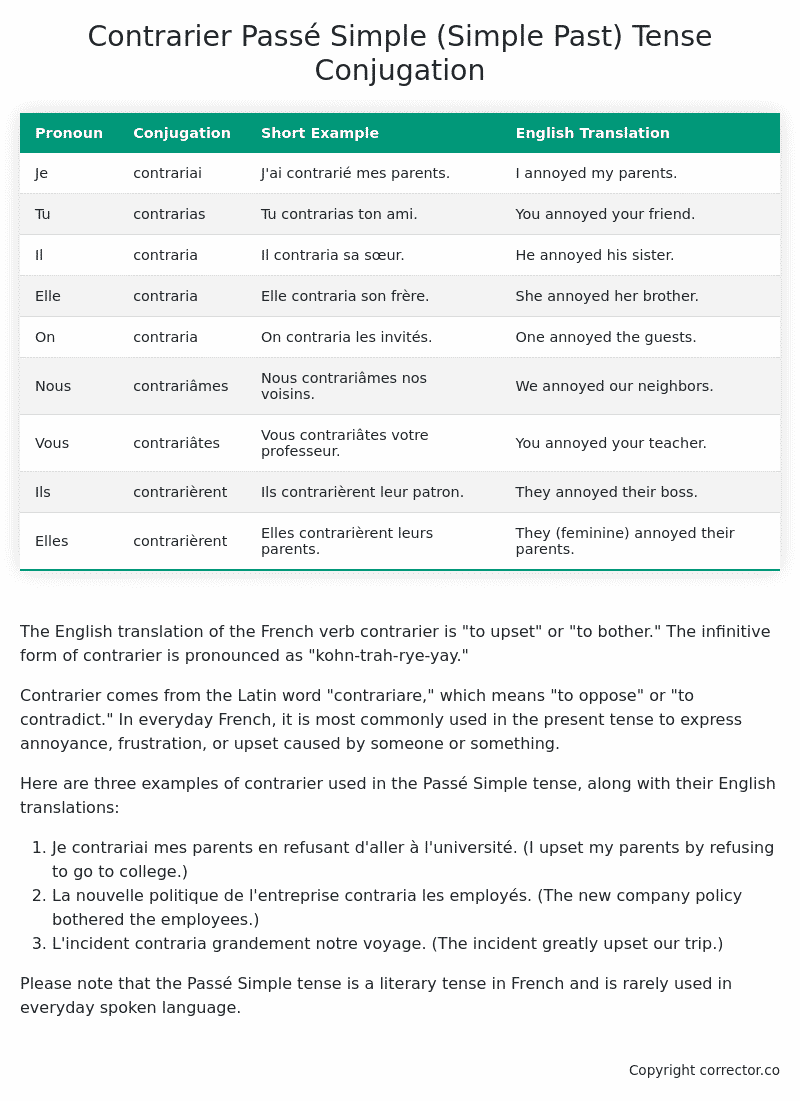Passé Simple (Simple Past) Tense Conjugation of the French Verb contrarier
Introduction to the verb contrarier
The English translation of the French verb contrarier is “to upset” or “to bother.” The infinitive form of contrarier is pronounced as “kohn-trah-rye-yay.”
Contrarier comes from the Latin word “contrariare,” which means “to oppose” or “to contradict.” In everyday French, it is most commonly used in the present tense to express annoyance, frustration, or upset caused by someone or something.
Here are three examples of contrarier used in the Passé Simple tense, along with their English translations:
- Je contrariai mes parents en refusant d’aller à l’université. (I upset my parents by refusing to go to college.)
- La nouvelle politique de l’entreprise contraria les employés. (The new company policy bothered the employees.)
- L’incident contraria grandement notre voyage. (The incident greatly upset our trip.)
Please note that the Passé Simple tense is a literary tense in French and is rarely used in everyday spoken language.
Table of the Passé Simple (Simple Past) Tense Conjugation of contrarier
| Pronoun | Conjugation | Short Example | English Translation |
|---|---|---|---|
| Je | contrariai | J’ai contrarié mes parents. | I annoyed my parents. |
| Tu | contrarias | Tu contrarias ton ami. | You annoyed your friend. |
| Il | contraria | Il contraria sa sœur. | He annoyed his sister. |
| Elle | contraria | Elle contraria son frère. | She annoyed her brother. |
| On | contraria | On contraria les invités. | One annoyed the guests. |
| Nous | contrariâmes | Nous contrariâmes nos voisins. | We annoyed our neighbors. |
| Vous | contrariâtes | Vous contrariâtes votre professeur. | You annoyed your teacher. |
| Ils | contrarièrent | Ils contrarièrent leur patron. | They annoyed their boss. |
| Elles | contrarièrent | Elles contrarièrent leurs parents. | They (feminine) annoyed their parents. |
Other Conjugations for Contrarier.
Le Present (Present Tense) Conjugation of the French Verb contrarier
Imparfait (Imperfect) Tense Conjugation of the French Verb contrarier
Passé Simple (Simple Past) Tense Conjugation of the French Verb contrarier (You’re reading it right now!)
Passé Composé (Present Perfect) Tense Conjugation of the French Verb contrarier
Futur Simple (Simple Future) Tense Conjugation of the French Verb contrarier
Futur Proche (Near Future) Tense Conjugation of the French Verb contrarier
Plus-que-parfait (Pluperfect) Tense Conjugation of the French Verb contrarier
Passé Antérieur (Past Anterior) Tense Conjugation of the French Verb contrarier
Futur Antérieur (Future Anterior) Tense Conjugation of the French Verb contrarier
Subjonctif Présent (Subjunctive Present) Tense Conjugation of the French Verb contrarier
Subjonctif Passé (Subjunctive Past) Tense Conjugation of the French Verb contrarier
Subjonctif Imparfait (Subjunctive Imperfect) Tense Conjugation of the French Verb contrarier
Subjonctif Plus-que-parfait (Subjunctive Pluperfect) Tense Conjugation of the French Verb contrarier
Conditionnel Présent (Conditional Present) Tense Conjugation of the French Verb contrarier
Conditionnel Passé (Conditional Past) Tense Conjugation of the French Verb contrarier
Conditionnel Passé II (Conditional Past II) Tense Conjugation of the French Verb contrarier
L’impératif Présent (Imperative Present) Tense Conjugation of the French Verb contrarier
L’impératif Passé (Imperative Past) Tense Conjugation of the French Verb contrarier
L’infinitif Présent (Infinitive Present) Tense Conjugation of the French Verb contrarier
L’infinitif Passé (Infinitive Past) Tense Conjugation of the French Verb contrarier
Le Participe Présent (Present Participle) Tense Conjugation of the French Verb contrarier
Le Participe Passé (Past Participle) Tense Conjugation of the French Verb contrarier
Struggling with French verbs or the language in general? Why not use our free French Grammar Checker – no registration required!
Get a FREE Download Study Sheet of this Conjugation 🔥
Simply right click the image below, click “save image” and get your free reference for the contrarier Passé Simple tense conjugation!

Contrarier – About the French Passé Simple (Simple Past) Tense
Formation
Usage
Narration
Historical Context
Interactions with other tenses
Passé Composé
Imparfait
Conditional and Subjunctive
Summary
I hope you enjoyed this article on the verb contrarier. Still in a learning mood? Check out another TOTALLY random French verb conjugation!


